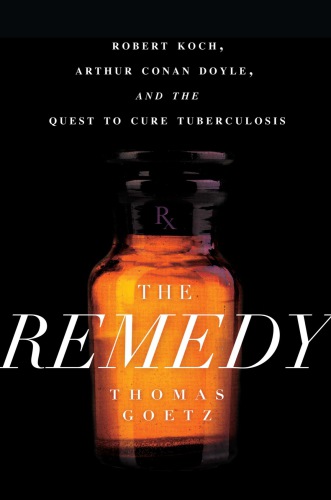
The Remedy
Robert Koch, Arthur Conan Doyle, and the Quest to Cure Tuberculosis
کتاب های مرتبط
- اطلاعات
- نقد و بررسی
- دیدگاه کاربران
نقد و بررسی

January 13, 2014
Former Wired executive editor Goetz (The Decision Tree) offers an intriguing medical and literary history based on “accidental partners in a profound social shift toward science and away from superstition.” Robert Koch, a meticulous and ambitious German country doctor-turned-scientist, isolated the bacteria causing TB and, Goetz writes, in doing so “offered a template” not only for medical science but for “all scientific investigation.” Physician and Sherlock Holmes creator Arthur Conan Doyle also viewed “science as a tool,” and Koch’s work in microbiology “provided the template” for Doyle’s fictional detective’s fascination “with minuscule detail.” Though his scientific work remains an important legacy, Koch never achieved the fame he sought in finding a cure for TB. Yet, Goetz notes, “Koch’s science became a kind of remedy nonetheless,” changing the perception of the disease as “something that could be understood and defended against.” Ironically, Doyle, though an admirer of Koch, would ultimately help debunk Koch’s failed theory that an injection of “lymph” could cure TB. But this pair’s fascinating, convergent stories have much more in common, as Goetz aptly demonstrates that both Koch and Doyle were doggedly inquisitive men who discovered that neither germs nor crime are any match for science. Agent: Chris Calhoun.

February 1, 2014
The story of a pair of unlikely heroes who crossed paths in Berlin in 1890 and forever changed the landscapes of medicine and literature. In the late 19th century, tuberculosis was an incurable scourge that killed indiscriminately and ravaged populations; for decades, it was the leading cause of death in Europe and the United States. The origin of the disease was a complete mystery, as was its uncanny ability to travel from one person to another. One young country doctor in Germany, Robert Koch (1843-1910), became determined to apply new theories of microbiology to his study of TB. His great breakthrough, that "germs" are isolatable bacteria that have infectious properties, profoundly changed the field of medicine. Meanwhile, another young country doctor, Arthur Conan Doyle, followed news of Koch's discovery from England. A moonlighting writer, Doyle traveled to Berlin when Koch announced a demonstration of a "cure" he'd devised from his laboratory research. Doyle's disappointment was acute; while Koch's germ theories were revolutionary, his remedy was bunk. Doyle pulled no punches in his takedown of Koch's remedy, but what he learned about Koch's methodology and earlier success left an indelible impression on his fiction. The idea of scientific detective work inspired Doyle to give up medicine and pursue literature full-time, and the character Sherlock Holmes--with his signature "science of deduction" technique--was born. Atlantic correspondent Goetz (The Decision Tree: Taking Control of Your Health in the New Era of Personalized Medicine, 2010) weaves these two narratives through a history of medical best practices, a fascinating period marked by improved hygienic practices and the possibility of new vaccines. Koch's legacy remains robust (he was awarded a Nobel Prize in 1905 despite his remedy gaffe), and his great accomplishment is a tenet that Doyle held dear in his stories: There exists a possibility of defense from any attacking agent, so long as the right clues are uncovered. A beguiling real-life medical detective story.
COPYRIGHT(2014) Kirkus Reviews, ALL RIGHTS RESERVED.

June 15, 2014
Goetz (Decision Tree; former executive editor, Wired) offers a brief and insightful double biography of two doctors: German-born Robert Koch (1843-1910), the "father of microbiology," who was convinced he had found a remedy for tuberculosis, and Arthur Conan Doyle (1859-1930), who traveled to Germany to witness this cure and eventually helped to debunk it. Koch used meticulous application of scientific principles to discover the cause of the disease and Doyle employed the scientific approach as a model for his fictional sleuth Sherlock Holmes's crime-solving methods. Koch's life, from his initial work with anthrax through the discovery of the cause of tuberculosis, the "tubercle bacillus," and his reported medicine development is described. It is combined with the story of Doyle's rise as a physician, his interest in Koch's work (including the trip to Germany to hear about his remedy), as well as his desire to share the events, and how he used those medical skills to create the Holmes episodes. VERDICT This book will be of interest to those who enjoy reading about history and science and 19th-century Europe, as well as fans of Sherlock Holmes. It is a pleasure to read, contains solid notes for additional information, and will have a wide appeal.--Eric D. Albright, Tufts Univ. Lib., Boston
Copyright 2014 Library Journal, LLC Used with permission.

March 15, 2014
Tuberculosis has been around a long time. And the number of deaths attributable to TB makes it the most lethal contagious disease in human history. In 1882, German scientist Robert Koch identified its cause, Mycobacterium tuberculosis, a slow-growing but hardy bacteria. He also devised many laboratory and research innovations, including his famous set of Koch's postulates. Koch's professional rival was Louis Pasteur. Another celebrated contemporary, author Arthur Conan Doyle, admired, critiqued, and in some ways mirrored Koch. Doyle and Koch began their careers as country doctors but aspired to be much more. Each valued attention to detail. Both were sleuths. Koch was a medical detective. Doyle was the creator of Sherlock Holmes, fiction's most famous detective. Both flirted with fraud. For Doyle, it was superstition and spiritualism. For Koch, it was tuberculin, a bogus cure for TB. Goetz, a science writer and past executive editor of WIRED, brings together biography and scientific history, personal ambition and discovery, and a deadly infectious disease in a captivating tale.(Reprinted with permission of Booklist, copyright 2014, American Library Association.)

























دیدگاه کاربران